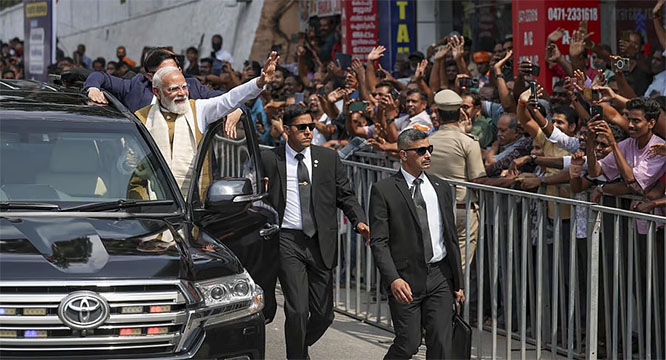Paris, Nov 18: Lebanese Prime Minister Saad Hariri arrived in France on on November 18 from Saudi Arabia, where his shock resignation announcement two weeks ago sparked accusations that he was being held there against his will.
Mr. Hariri is in Paris at the invitation of France's President Emmanuel Macron, who is attempting to help broker a solution to a political crisis that has raised fears over Lebanon's fragile democracy.
Lebanese President Michel Aoun said he had spoken by telephone to Mr. Hariri, who said he would be back in Lebanon for Independence Day celebrations on November 22.
Mr. Hariri and his wife flew in overnight from Riyadh and were whisked to their Paris residence under tight security.
They arrived without their children, with the younger two — Loulwa and Abdelaziz, born in 2001 and 2005 — staying behind in Riyadh "for their school exams", a source close to Mr. Hariri said.
Their elder son Houssam, born in 1999, was due to arrive in Paris separately from London.
"Hariri does not want to mix his children up in this affair," the source said.
Mr. Hariri, who along with Saudi officials has repeatedly denied that he was being held under de facto house arrest in Riyadh, hammered home the message just before his departure.
"To say that I am held up in Saudi Arabia and not allowed to leave the country is a lie," he said in a Twitter post.
A source close to Mr. Hariri said the premier had held an "excellent, fruitful and constructive" meeting with the powerful Saudi Crown Prince Mohammed Bin Salman before he left.
Mr. Hariri, a dual Saudi citizen who has previously enjoyed Riyadh's backing, announced his resignation on November 4. He said he feared for his life, accusing Iran and its powerful Lebanese ally Hezbollah of destabilising his country.
Escalating battle for influence
But Mr. Hariri's failure to return from Saudi Arabia prompted claims he was essentially being held hostage there, including from Lebanon's President, who refused to accept his resignation from abroad.
Mr. Hariri's resignation was widely seen as an escalation of the battle for influence between Sunni Saudi Arabia and Shia Iran, regional arch-rivals which back opposing sides in the conflicts in Syria and Yemen.
His attempt to step down also coincides with a purge of more than 200 Saudi princes, Ministers and businessmen.
Mr. Hariri met French Foreign Minister Jean-Yves Le Drian in Riyadh on November 16 as Paris, which held mandate power over Lebanon for the first half of the 20th century, seeks to ease the crisis.
In another development, Riyadh on November 18 recalled its ambassador to Berlin in protest at comments by Germany's Foreign Minister Sigmar Gabriel which were interpreted as a suggestion that Mr. Hariri acted under Saudi orders.
Without mentioning Saudi Arabia directly, Mr. Gabriel had said on November 16 that he shared concerns about the threat of instability and bloodshed in Lebanon and warned against "adventurism".
"Lebanon has earned the right to decide on its fate by itself and not become a pinball of Syria or Saudi Arabia or other national interests," he had said earlier in the week.
‘Start of a solution’
Ahead of Mr. Hariri's departure, Mr. Aoun — an ally of Hezbollah — welcomed the trip to Paris, expressing hope that it was the "start of a solution".
"If Mr. Hariri speaks from France, I would consider that he speaks freely," Mr. Aoun said. "But his resignation must be presented in Lebanon, and he will have to remain there until the formation of the new government."
France's intervention was the latest in a string of European efforts to defuse tensions over Lebanon, where divisions between Mr. Hariri's Sunni bloc and Shia Hezbollah have long been a focal point in a broader struggle between Riyadh and Tehran.
Mr. Hariri — whose father, ex-Prime Minister Rafik Hariri, was killed in a 2005 car bombing blamed on Hezbollah — took over last year as head of a shaky compromise government which includes the powerful Shia movement.
Saudi Arabia's Foreign Minister Adel al-Jubeir insisted from Madrid that "unless Hezbollah disarms and becomes a political party, Lebanon will be held hostage by Hezbollah and, by extension, Iran".
Mr. Hariri's resignation comes as the long-standing rivalry between Saudi Arabia and Iran intensifies and as Riyadh undergoes a major shake-up under the ambitious crown prince.






Comments
Add new comment